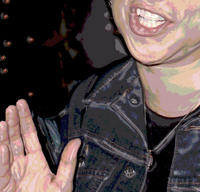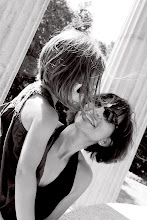
Artsy-Fartsy Talk-- attempting to verbalize the visual
I'm entering into the world of art -- with a bizarre mix of excitement and trepidation, optimism and cynicism, doubts and grand dreams, and undoubtedly some naivete. I've been painting for a dozen years, but I am just now getting more "serious" about my artwork, getting involved in local artist groups, and I've just had my first exhibit.
I thought I'd start this art blog -- to capture my thoughts during this time of exploration, and to find another way to "be an artist." Meaning the blog can at least help me get started in "talking the talk."
So, I'll start with my thoughts on art talk itself.
My day job is in communications, so theoretically, talking and writing about art should be the easy part for me. But au contraire. Verbalizing the visual has proved more difficult than facing the dreaded white canvas.
There are two fears-- one, not wanting to sound like a stuffy, pseudo-intellectual, artsy-fartsy goon, and two, not wanting to sound-- or be-- completely full of myself.
It took me several months to write my artist statement, and I'm still tweaking it. In fact, I wonder if it will ever be final, or if I'll ever be completely comfortable with it. To get started, I looked online and found how-to tips... how long it should be, what it should cover, and sample statements. The general advice was that your artist statement should explain your inspiration. But for years I had avoided conversations of 'what is your art about?' or 'what does it mean?'
When I found artist statements where the work was an expression of something timely and controversial, say the diminishing ozone layer, or where the artist was from another country, I was honestly jealous. Everyone seems to have something to say about the ozone, for example. So, it seems safe or easy --natural and universal that there would be a sense of emptiness or concern to convey.
And from another country-- maybe it's just me, but I love that one! It feels like an automatic ticket to understanding. Ah, here I see the colors of Mexico or the reflection of the strife of the people in the Middle East. And when the artist and the work is from somewhere else, it feels somehow immediately special. It's different, otherworldly, more artistic.
My artwork happens to be particularly personal. Therefore, it carries the risk of sounding particularly self-absorbed. It comes from my emotions, and often from my struggles and pains. If I were painting images that were some type of social commentary, I suspect it would be easier for me to talk about it. I could comment on the outside world more readily than my inside world. But perhaps not. I think that all art-- or at least all good art-- is ultimately a personal portrayal or reflection of the artist. And it can be difficult to lay out your inner emotions in plain words. Then it's even trickier to somehow tie those emotions to why you chose the particular shade of Thalo green for the left side of the face.
Sometimes the answer is simply, "I don't know."
Or "Because."
Or "Do you like it or not?! Just look. Don't ask questions."
Other times it might be, "Because I was sick with doubts and self-reproach. Because I was on the verge of getting through a painful time, still a little sick on the inside but knowing I could get through it and find joy and optimism... Yeah, and that yellow part is the optimism."
I find that these types of explanations can sound simultaneously meaningful and trite... and back to fear #2 -- potentially full of myself.
But then I say to myself (dear God, is there also internal art talk?!), "Am I doing this art thing or not?" If so, I have to be able to talk about it.
An experience of art can simply be looking at it, and having whatever straightforward reaction comes to you. You like it, you don't, you feel happy or sad, or whatever.
Another way of experiencing art is to try to understand it, and to try to understand what the artist is attempting to convey. Inevitably, that understanding seems to require a conversation with actual words. I suspect that conversation and understanding may enable people to better appreciate and enjoy the art.
And I'm pretty sure that's the point in the first place.
So, I dive in, finding what words I can. Through trial and error, I am finding which words I'm comfortable with, which ones I wish I might have skipped, and which ones seem to make sense to people.
The easiest ones to find so far, have been "Thank you." For coming to my reception, and for looking at my artwork. And for listening to my artsy-fartsy talk.


0 Comments:
Post a Comment
<< Home